NHS 70: One Indian doctor's take on life in Swansea
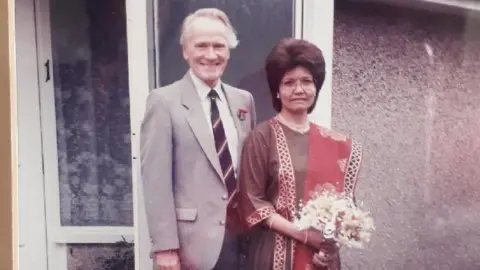 Family photo
Family photoNirmal Anand never expected to make a life for herself in Swansea.
Forty-six years ago the then 29-year-old was a successful doctor in her native India, but she was on the look out for adventure - and the UK desperately needed doctors to staff its massively expanding health service.
To mark the NHS's 70th year she shares what it was like to be one of the more than 18,000 doctors from the Indian subcontinent who became the backbone to the NHS.
"I was working in gynaecology in India in Agra. It was a very good job and I was earning a lot of money - which made me feel bored.
"I was young. I thought, 'Is this the life I'm going to have? Money and then get married and have children?'"
So, in 1972 Dr Anand decided to follow in the footsteps of many Indian doctors before her and leave home for the UK to work in the NHS.
"Some of my friends were already in the UK.... I decided to come over here, look at the country, get some experience and then go back.
"I didn't come with the idea to settle down... but life changes."
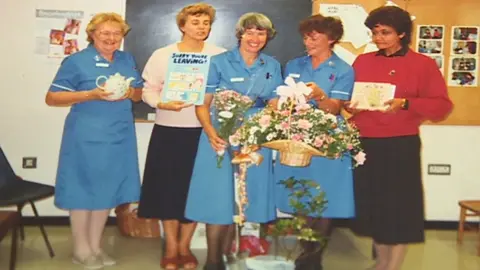 Family photo
Family photoShe spent time working in St Andrews - "It was very, very cold, I had a problem with the accents" - Newcastle, the Lake District - where "it rained a lot" and Kent.
Then in 1976 she took a post in community health at a family planning clinic in Swansea.
But coming from India, which had no national health service, she found people took the service for granted: "There's lack of awareness, lack of education. They've been spoilt because the help is given by the NHS.
"Expectations are very high. They depend and they are not contributing enough... this is not the way to work.
"I think obesity is a big problem... people don't cook food. They are coming from Tesco and Asda with ready cooked meals, and they are on benefits. When you see the trolley full and the taxi coming - where are they getting all of the money?
"When you cook one casserole, 10 people can eat it."
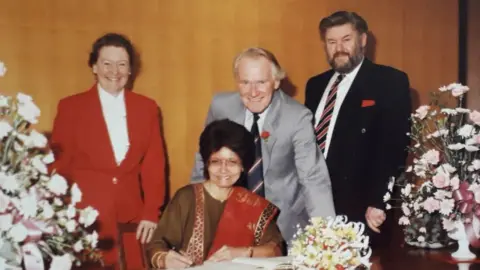 Family photo
Family photoBut she found her patients and community very welcoming: "People here are family-orientated, very co-operative, very welcoming, very supportive. they make you feel comfortable and the staff in NHS are wonderful.
"[The Welsh] speak like Hindi language. You make friends easily with them, just like family. I didn't feel uncomfortable at all."
She was soon enjoying coastal walks: "We used to spend days in Mumbles and I fell in love because I'm a nature-loving person and love walking."
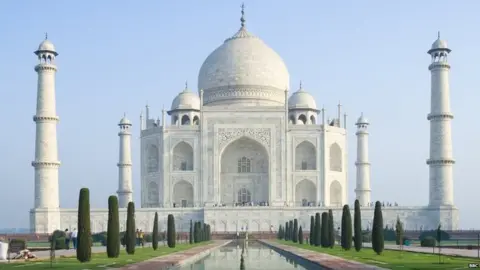
At work she was busy computerising systems, producing booklets and introducing a mobile breast examination service for women living in deprived areas.
"They gave me the full responsibility of family planning. It was a facelift for West Glamorgan, so everything was appreciated."
She was soon promoted to clinical manager in cervical cytology and family planning: "That was the best thing that happened in my life.
"I used to train the GPs and nurses, organise courses... I introduced a psychosexual clinic - we used to invited the couple and make them talk so they would resolve their own problems.
"I feel proud as a person coming from a different country, shy and quiet, and teaching people gave me a lot of confidence."
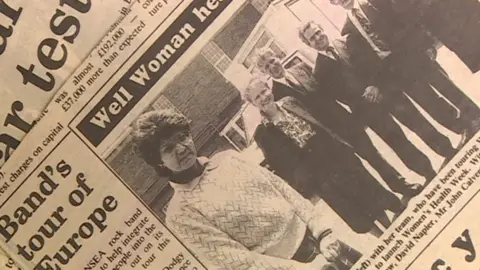
And before long a friendship she had developed with her neighbour David Clarke took a romantic turn: "He had a lot of knowledge about India.
"He had already been mountaineering in Nepal. We went trekking in the Himalayas. He trained me in Pennard. We went to Snowdon and Pen y Fan."
After seven years together they were married at a register office in Swansea.
Shortly after her marriage she retired and took up voluntary work in Nepal but she could not stay away for the NHS for long: "I was missing my work in medicine so I got a job in the Carmarthenshire NHS. I introduced there what I introduced in West Glamorgan."
Her husband died in 2009 and now aged 75 and fully retired Dr Anand has time to reflect on her life in Swansea and her achievements.
She has one regret - not having children: "My only regret. I was so busy in my job - one after the other. I achieved so much."
She remains a huge fan of the NHS: "Each person who lives in the UK is treated and well cared for... whether you've got money or employment they won't let you die.
"In India, there is no national health. If you don't have money you sell your property."
And she has no plans to ever leave the place she now calls home: "Swansea has all I wanted.
"I'm very happy in Wales because I'm a nature-loving person, I love walking, I fell in love and had achievement in my profession.
"It made my career and I feel very happy."
